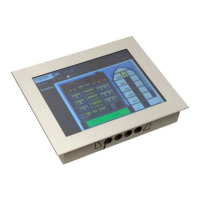L-VIS User Manual 247 LOYTEC
Version 6.2 LOYTEC electronics GmbH
3. A new data point is created, which contains a special client mapping to read the active
priority out of the remote object.
10.16.3.3 Write with Priority
In BACnet objects containing a priority array, the effective value depends on the values
written to the individual priority slots. To access these slots, additional priority output data
points can be added for writing to the BACnet object at different priorities. A write priority
between 1 and 16 can be specified which each of the output points.
To Create a Priority Write Data Point
1. Select the commandable BACnet server object.
2. Right-click and select Create Priority Write Point… from the context menu.
3. A dialog pops up and prompts for the write priority. Note that write priority can also be
changed later.
4. The new priority write data point appears below the original BACnet server object data
point.
10.16.4 Remote Network Object
Since there is a lot of information required to create a mapping for a remote network object,
such objects are usually only created from existing templates. The first step therefore is to
either scan the network for remote network objects or import a file, to get a list of available
template objects from which new mappings may be created.
10.16.4.1 CSV / EDE Import
Use the context menu of the file import folder and select the command Import File. Browse
to the CSV file you want to import and select it. For BACnet models, standard EDE files
may be imported through this method. For CEA-709 models, a similar file format was
specified so that tools may be developed which are able to output data in a format the
configuration software is able to read. An example CSV file for CEA-709 is installed
together with the configuration software.
Once opened, the contents of the file will be parsed and suitable data point templates will
be created in the file import folder. These templates are then used in a later step to create
client mappings for use on the L-VIS device (see section 10.16.4.3 below).
10.16.4.2 Network Scan
Scanning an existing network is another way to generate template data points. Depending
on the type of device and the current operating mode of the configuration software, there
are different ways to scan the network:
BACnet, no connection to a device: In this mode, there is currently no way to
scan the BACnet network. To execute the scan, a connection to a BACnet device
must be established first.
BACnet, connected to a device: The network can be scanned by the L-VIS
device, which reports the results back to the configuration software. To start the

